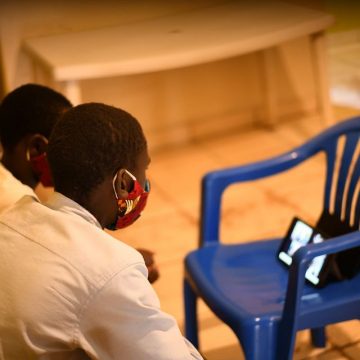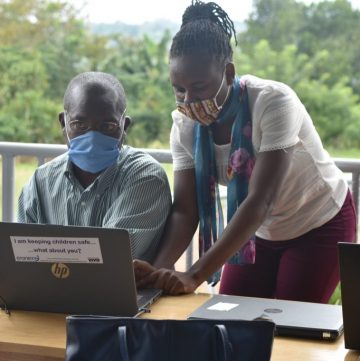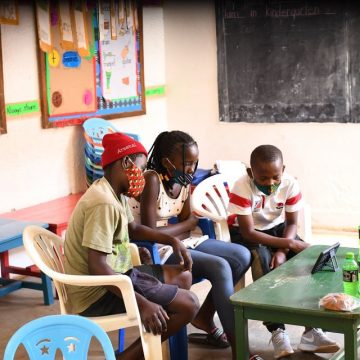COVID-19 RESPONSE
How we’re adapting our work in response to the COVID-19 pandemic.
The lock-down has disrupted schooling, caused emotional distress due to social distancing, and increased poverty. We came up with strategies to address the effects of the lock-down by COVID-19 and for the post-COVID-19 era.
CRANE has also developed a coordinated response to provide support for girls whose learning is impacted by school closures. Connection with parents, head teachers, District education leaders, and the Ministry of Education has helped to jointly respond to this crisis to keep children learning and maximize the likelihood that they will return once schools reopen. Schools have been closed since March 18th. This has impacted 15 million school children, 1/3rd of Uganda’s population.



We made some adjustments in plans and the budget to adapt to the COVID-19 situation while implementing some activities; these include:
Rescue of 198 children from the street
Worked with government through KCCA and other organizations that are part of the network. The children underwent rehabilitation at an isolation center provided by KCCA for close to months. They were taken on for rehabilitation by different Child care institutions before resettlement while the older children were taken on for vocational skills training by KCCA.
Access to learning through social media:
CRANE tasked its teaching team to be creative to reach families that only have phones, using mixed media learning to provide remote support. We have also provided hard-copy learning resources/self-study packs, made learning calls, podcasts, and WhatsApp and SMS messages that require less data usage. Messaging included sharing key health and safeguarding messages, and counselling. New tools have been generated to inform the delivery of remote education. This will be our core-operating model during the crisis. CRANE has produced high-quality child-centered learning literacy and numeracy messages that were broadcast on community radios. This is a very powerful tool in rural communities. The table shows the number of girls supported during the quarter.
CRANE mentors made 3,408 contacts through phone calls, SMS, and visits to relieve psychosocial stress.
This was done to reduce the anxiety and worry among families because of COVID-19 related challenges like limited access to food. Mentors also used the new Viva phone COVID-19 mentoring program to support families with knowledge in countering COVID-19 related challenges. Besides, 320 families are on a specific psycho-social 6-week support package, and 1,471 calls were made. More families living at far distances and who did not have phones or could not be reached on the phone during the quarter will be reached out to once people are allowed to travel more using public means of transport.
Support for Children with Disabilities:
Due to the COVID-19 transport restrictions, the project was able to obtain a sticker from the ministry of health. 32 girls with disabilities were supported able to access health centres for medication and therapy. In total, the project supported 125 beneficiary girls with disabilities to access learning during the lockdown. From the new KCCA Assessment Centre, of the 125 GEC T-girls supported, 32 were also supported to access medical aid. 75 girls and 51 boys with disabilities non-GEC-T from the communities were also supported to access medical aid during the lockdown. 1,270 families with children with disabilities in the supported communities were supported with food relief during the quarter in collaboration with the KCCA Education and the Assessment coordinator who works for the project.
Community Radios
Community radios are media platforms that enable isolated communities of ordinary people across Uganda to voice issues that are central to them. On average, one community radio can reach out to five villages. To increase community awareness, the project used 19 community radios to reach out to 106 villages. Community radios are community-led media platforms for the rural poor in Uganda. They were used to increase awareness of COVID-19, child protection, gender-based violence, child friendly justice, and Positive Parenting. The messages were interpreted in the local languages to address the needs of the beneficiaries.
Tracking the use of the “I CAN…” Journals
- 748 journals were given to beneficiaries during the quarter and 534 girls are reported to have used the journals in the following ways;
- Guidelines on how to run their daily activities
- The “I Can…” journals have helped learners to schedule their daily work and learning from home. After a long day, they relax their mind by completing some tasks from the “I can…” Journal and most fun games” said the LST St. Paul Kyebando.
- “To account for their time by showing whatever they do every day,” said Bright Trust LST
- “They say the book is helping to discover who they are and what they are capable of doing,” said the LST for Bugabo
- “Games make them enjoy as they learn some skills”
“It has helped learners to set their targets and track their progress,” said the Paul Mukasa SS LST teacher
Collaboration with National Curriculum Development Centre
The project developed video resources for Children in collaboration with the National Curriculum Development Centre. Project teachers supported NCDC specialists to produce lessons for both TV and radio. The project also provided human resources and equipment to record TV and Radio lessons. These were uploaded on YouTube and shared on the NCDC website. CRANE provided Uganda sign language interpreters to ensure that the lessons are delivered with Uganda sign language interpretations.
Virtual Teacher Training
50 Female, 21 Male learning support teachers were trained in developing Individualised Education Plans
Follow up of Child Protection Cases
56 emergency situations of girls of which 18 were cases of abuse.
Provision of food rations to marginalised families
383 GECT families identified to be at risk received food relief during the lockdown. These were selected based on: High dependency burden (above 6 children) 179 families; elderly caregivers, 22; caregivers with terminal illnesses 46; families with teenage mothers, 26; families having children with disabilities, 110.
Through collaboration with other partners, the project provided food to other 1,270 families with children with disabilities in the communities.
Medical support, psychological and safeguarding support for children with disabilities
Support to GECT girls with disabilities: Medical Refill: 23 girls. Transport to medical facilities: 9 girls.
Support to community children/ siblings with disabilities: Medical refill: 45 girls,36 boys,
Transport to Medical facilities: 30 girls, 15 boys
Psychological first aid: 13 girls,1 boy
Safeguarding: 6 girls, 4 boys
Mentoring of families.
Mentors made 3,408 contacts to 2,746 stakeholders; girl beneficiaries and their families, government staff, and local school administrators during the quarter. 2,421 were contacts with girls who are direct beneficiaries.
Day of the African child.
This was commemorated on 16th June under the theme “Child-Friendly Justice” through a virtual meeting with children. The meeting engaged 46 (26F, 20M) children and 26 adults, who mainly listened in since it was a children’s show.
DAC virtual meeting face book numbers stood at 1507 people reached.
Procurement of Tablets for girls to aid Remote Learning.
223 tablets: 30 for pre-service teachers and 193 for girls in candidate classes (senior four and senior six)
Rescue of 198 children from the street.
Worked with government through KCCA and other organizations that are part of the network. The children underwent rehabilitation at an isolation center provided by KCCA for close to months. They were taken on for rehabilitation by different Child care institutions before resettlement while the older children were taken on for vocational skills training by KCCA.
Vocational Support for marginalised girls to enable them transition to work in the field of agriculture is among the skilling programs implemented by CRANE under the Girls’ Education Challenge Transition Project(GEC-T).
On the background that Uganda thrives on an agro-based economy, the program aimed at equipping 10 girls with agri-business skills and knowledge to tap into this opportunity for self-reliance.